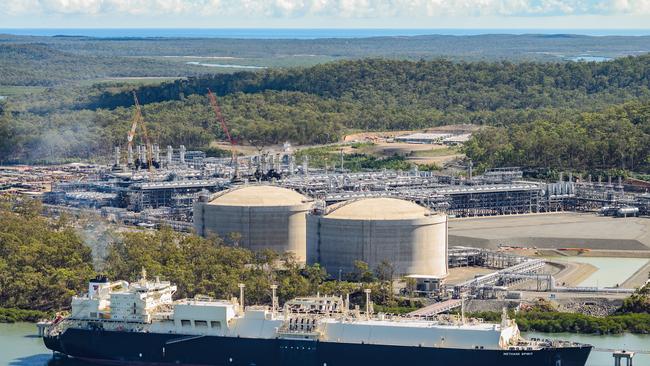Origin warns profits to fall further in 2021
Origin Energy will hold off investing in new power generation, threatening a pipeline of needed generation.

Origin Energy will hold off investing in new power generation due to low wholesale electricity prices and policy settings, threatening a pipeline of generation needed to back up renewables in the national electricity market.
Australia’s largest electricity retailer, which warned of an earnings fall of up to $309m in its electricity and gas retailing business in 2021, said the steep drop in power prices and government policy settings had created uncertainty to the near-term outlook.
“It would be fair to say that at current market prices investing would be difficult,” Origin chief executive Frank Calabria said. “That doesn’t mean that these opportunities won’t present themselves at the right time but it’s just right now I don’t think you could get the confidence out of combination of both of those things to actually make the investment decisions.”
Origin shelved a proposed expansion of its Shoalhaven-pumped hydro project in NSW, with the investment failing to stack up partly due to the impact of the giant government-owned Snowy 2.0 on the electricity market. It has a list of other projects spanning fast start gas and batteries which could get approval should market conditions change.
Up to 19 gigawatts of dispatchable resources such as batteries, pumped hydro and fast-start gas plants will be required in the next two decades to back up renewables, according to the Australian Energy Market Operator.
However, the nation’s biggest power players have been wary of committing to major spending given market and regulatory uncertainty. AGL Energy warned the rapid fall in electricity and gas prices could result in an investment strike, raising concern as the country looks to boost generation before coal plants retire.
Origin endured a tough year as adverse market conditions cramped earnings, with its annual profit plummeting by 93 per cent due to LNG writedowns and bad debts from COVID-19.
Origin saw its bottom line earnings plunge to $83m, from $1.21bn in the 2020 financial year, after taking a $1.2bn writedown in July. That was still well ahead of consensus showing a $173m loss.
It delivered underlying 2020 profit of $1.023bn, just under consensus.
But the group said earnings from its core energy markets division would decline by up to 21 per cent, or $309m, to a range of $1.15-1.3bn in the current year — from $1.46bn in 2020.
The guidance reflects the impact of lower wholesale prices, higher network costs and lower gas profit as legacy contracts expire. APLNG production is also estimated to be as much as 8 per cent lower, at 650-680 petajoules, due to weaker demand as the Asian LNG glut dampens the market.
Origin received a record $1.275bn annual cash distribution from APLNG, which was at the top end of a $1.1-1.3bn range and nearly a third higher than last year’s $974m payout. It declared a final dividend of 10c a share, down from 15c in 2019.
RBC described it as a solid result.
“Origin has delivered a solid EBITDA result in line with guidance and our forecast, although the final dividend of 10c per share is below our expectation (board decision),” RBC analyst Gordon Ramsay said. “We think FY21 guidance is a positive, as it is in line with our outlook, although the APLNG production outlook is slightly lower.”
The company became the latest victim of the oil price crash in July, confirming a $1.2bn hit in writedowns and charges, including on its APLNG gas export project in Queensland.
JPMorgan described it as a reasonable result, with “underlying EBITDA and NPAT slightly above our estimate, driven by better than expected contribution from Energy Markets,” JP Morgan analyst Mark Busuttil said. “The final dividend was slightly below forecast but net debt was also lower than expected.”
Origin shares fell 6.1 per cent to $5.54.


To join the conversation, please log in. Don't have an account? Register
Join the conversation, you are commenting as Logout